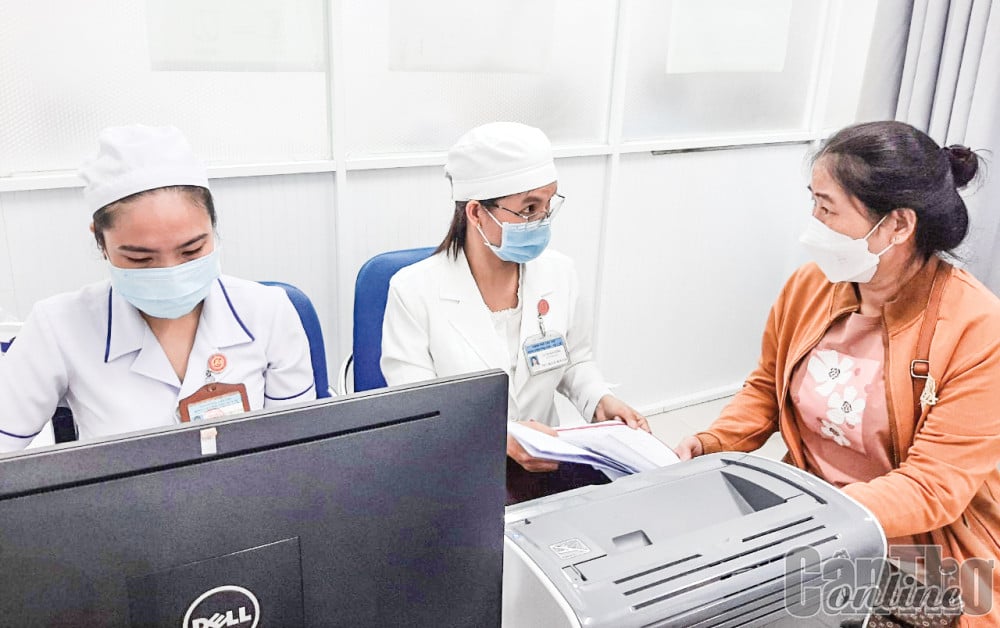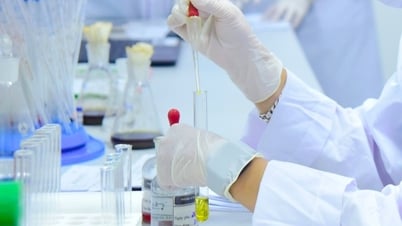Article and photos: THU SUONG
Premenopausal women rarely get pregnant because they do not want to, or because they are afraid of facing many health risks for both mother and fetus. However, in some cases, due to misconceptions about reproductive health, women still get pregnant in their later years, when they are already grandmothers.
During pre-menopause, women need to have regular check-ups to receive advice from specialists on solutions to balance their health and spirit. Illustration photo.
Ms. H. (44 years old, in Binh Thuy district, Can Tho city) got married early, so when she turned 40, she got married and married her two children. The children all took care of their business and built their happiness. Ms. Hang and her husband also enjoyed their old age, their love became more passionate because they had time for each other. However, she was very afraid of intimacy, afraid of unwanted pregnancy because her menstrual cycle was irregular. Recently, through the press, she learned about the case of a woman who had become a grandmother, but did not know she was pregnant until the 7th month of pregnancy. Ms. Hang and many other women have the same question: When does a woman no longer have the ability to get pregnant?
Dr. Nguyen Thai Hoang, Head of Post-Surgery Department, Can Tho City Obstetrics and Gynecology Hospital, said: Menopause usually occurs between the ages of 45-55, marking the end of the reproductive process in women. This process is characterized by the cessation of ovarian activity, manifested by the end of the menstrual cycle. Normally, the absence of menstruation for 12 consecutive months at this age confirms menopause.
Before entering menopause, a woman's body will go through a transitional period called premenopause, which can last for several months or even several years. During this period, a woman's body shows signs that the reproductive organs are no longer as active as before but have not completely stopped. At this time, reproductive hormones are secreted less, leading to menstrual disorders, accompanied by a number of phenomena such as: hot flashes, sweating, sleep disorders, anxiety, depression, easy weight gain, body aches, vaginal dryness, dark, wrinkled skin, osteoporosis, memory loss...
When entering menopause, the ovaries have completely stopped functioning, so they can no longer produce eggs, leading to the inability to conceive naturally. Therefore, women cannot get pregnant when they have truly gone through menopause. However, if a woman is in the pre-menopausal stage, the secretion of reproductive hormones, although reduced, has not completely stopped, and the risk of pregnancy, although low, still exists. The possibility of pregnancy during this stage is rare, often occurring when menopause occurs late, and women who want to get pregnant often have to have the intervention of active reproductive support measures.
Dr. Thai Hoang added that pregnancy at premenopausal age will increase the risk of disease for mother and fetus. For the mother, it increases the risk of preeclampsia, gestational diabetes, stillbirth, miscarriage, premature birth, cesarean section, etc. For the fetus, it increases the risk of chromosomal abnormalities such as Down syndrome, Patau syndrome, Edward syndrome and other malformations. The baby is at risk of premature birth, low birth weight, malnutrition and slow physical and psychomotor development. In fact, very few women in premenopausal stage still want to get pregnant due to the health risks for mother and baby. Therefore, contraceptive measures are very important for premenopausal women.
From the actual medical examination and treatment, doctors have recorded that some cases have incorrect understanding, such as not being able to get pregnant during premenopause. Although the ability to get pregnant in premenopausal women is lower than that of younger women, pregnancy can still occur during this transition period. Another common misconception is that women will go through premenopause with symptoms of menstrual disorders such as irregularities, abnormal increase or decrease in menstrual blood volume or amenorrhea for a period of time. Therefore, when a woman has missed her period for a few months, she thinks she has gone through menopause, but in fact, due to decreased hormones, the menstrual cycle is irregular, can miss menstruation for a short time and then reappear, and when the ovaries are still hormonally active, the risk of ovulation and pregnancy still exists.
Doctors recommend that women in the premenopausal stage should use contraception until they reach true menopause, meaning no continuous menstruation for 12 months or endocrine tests confirm menopause. Due to the decline in endocrine levels in premenopausal age as well as disorders, cardiovascular - metabolic diseases, and cancer that often appear in this age group, women should visit and be consulted by a specialist for advice on safe and effective contraceptive methods and to limit the side effects of the drug. Some measures to consider such as low-dose estrogen-containing contraceptives, progestin-only contraceptives, intrauterine devices, contraceptive implants, condoms, etc. are selected depending on the woman's constitution and medical condition.
Source link




![[Photo] Emotional and proud flag-raising ceremony and military review on Truong Sa island](https://vphoto.vietnam.vn/thumb/1200x675/vietnam/resource/IMAGE/2025/5/31/9b52525fce6f433083cd0a5bfee59f49)

![[Photo] Prime Minister Pham Minh Chinh attends the opening ceremony of the National Law Portal](https://vphoto.vietnam.vn/thumb/1200x675/vietnam/resource/IMAGE/2025/5/31/f02ed6288a4340bdb4adf1b2149b9614)

![[Photo] Launching ceremony and drawing of pairs for the "9th TIM CUP Highland Charity Football Tournament"](https://vphoto.vietnam.vn/thumb/1200x675/vietnam/resource/IMAGE/2025/5/31/a4c145af5d1e48c5b48c95116d41a73c)





















































































Comment (0)